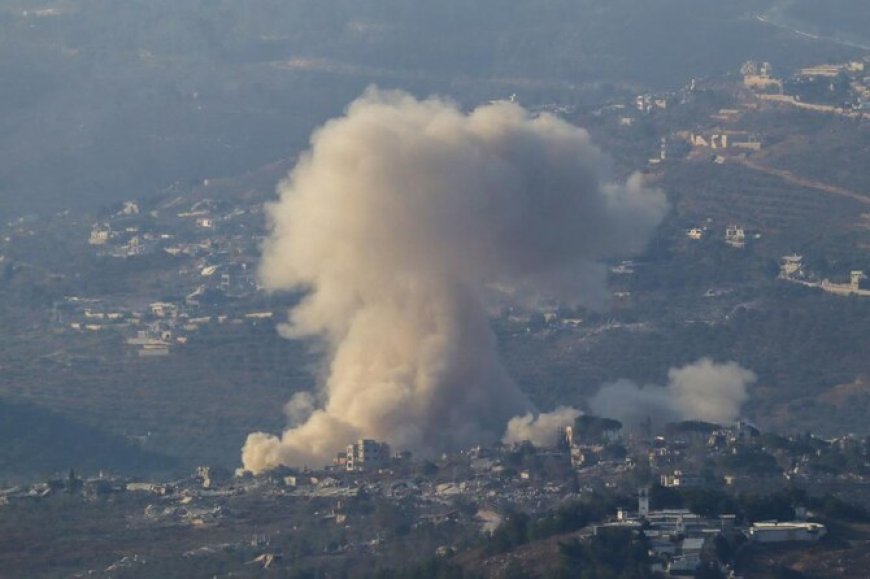Israel’s Devastating Campaign in Southern Lebanon Sparks Fears of Buffer Zone Creation
As Israeli forces continue their sweeping military campaign across southern Lebanon, scenes of extensive destruction, particularly in villages like Ramyah, reveal what many fear could be an attempt to create a depopulated buffer zone along the border. Israel claims its goal is to neutralize Hezbollah’s presence, but the scale and intensity of the campaign, which has displaced over a million Lebanese, raises questions about its broader objectives.

As Israeli forces continue their sweeping military campaign across southern Lebanon, scenes of extensive destruction, particularly in villages like Ramyah, reveal what many fear could be an attempt to create a depopulated buffer zone along the border. Israel claims its goal is to neutralize Hezbollah’s presence, but the scale and intensity of the campaign, which has displaced over a million Lebanese, raises questions about its broader objectives.
Since October 1, Israeli troops have been targeting Hezbollah positions across southern Lebanon, destroying key infrastructure and leaving entire villages in ruins. According to an Associated Press investigation, satellite imagery confirms extensive damage across 11 villages within four miles of the Israeli border, including Ramyah and Aita Al-Shaab, which lie on hilltops now largely reduced to rubble. These once-bustling communities have been emptied, a pattern that experts suggest mirrors Israel’s tactics along the Gaza border, where buffer zones have been implemented in the past to maintain distance from hostile forces.
Targeting Hezbollah or Creating a Buffer Zone?
Israeli officials assert the military incursions are necessary to destroy Hezbollah tunnels and weapons caches allegedly embedded within civilian areas. Orna Mizrahi, a senior researcher at Israel’s Institute for National Security Studies, argues that while Israel’s primary objective may not be to establish a permanent buffer, the strategy could shift depending on conditions on the ground. “We may have no other choice than staying there until we have an arrangement that promises us that Hezbollah will not come back to the zone,” she said.
However, the indiscriminate nature of the bombardments has fueled concerns. In Odeissah, for example, a controlled explosion destroyed much of the village, even triggering earthquake alerts in northern Israel. The blast obliterated the childhood home of Lebanese Philharmonic conductor Lubnan Baalbaki, whose family’s graves and cherished art collection were also lost in the rubble. Baalbaki lamented, “This house was a project and a dream for both of my parents.”
Israel’s military denies intentions to create a buffer zone, emphasizing that operations target Hezbollah’s weapons infrastructure. Israeli journalist Danny Kushmaro even documented the military’s demolition of a house believed to store Hezbollah munitions, underscoring the challenges in locating and neutralizing embedded assets. Despite such denials, videos posted by Israeli troops show soldiers planting Israeli flags on Lebanese soil, signaling a deeper incursion than previous campaigns.
UN Peacekeepers and the Lebanese Army Under Fire
The impact of the offensive is not limited to Hezbollah strongholds; Israeli attacks have also hit United Nations peacekeepers and the Lebanese army, entities mandated by international law to monitor and maintain peace in southern Lebanon. The UN Interim Force in Lebanon (UNIFIL) reported that its personnel and infrastructure have been hit at least 30 times since September, attributing 20 of these incidents directly to Israeli fire.
UNIFIL has refused to pull out, despite Israeli Prime Minister Benjamin Netanyahu’s calls for peacekeepers to vacate the area. However, analysts warn that if attacks on peacekeepers escalate, contributing nations may reconsider their involvement. Richard Gowan of the International Crisis Group noted that if UN peacekeepers start taking casualties, “you might see the mission start to crumble,” potentially leading to an open field for Israel and Hezbollah to clash without any moderating force.
Lebanese officials have condemned the strikes on their own forces as well, reporting at least 11 soldiers killed in recent Israeli attacks. Lebanese leaders argue that Israel’s actions undermine UN Resolution 1701, which ended the 2006 Israel-Hezbollah war by requiring a full Israeli withdrawal and barring Hezbollah from maintaining a presence within 15 miles of the border.
A New Agreement on the Horizon?
The United States is seeking to revive Resolution 1701 as part of ongoing efforts to broker a ceasefire, with U.S. envoy Amos Hochstein recently advocating for an updated agreement that would enforce the original resolution’s terms. Israel, however, has criticized the resolution’s efficacy, accusing UNIFIL and the Lebanese government of failing to prevent Hezbollah’s growth in the region. Lebanese parliamentarian Mark Daou, who opposes both Hezbollah and Israel’s intervention, expressed fears that Israel aims to weaken Hezbollah’s influence in the south while swaying public opinion against Hezbollah’s resistance efforts.
A potential Israeli buffer zone would complicate these peace efforts, potentially pushing Lebanon and Hezbollah into defensive positions. Yossi Yehoshua, military correspondent for Yedioth Ahronoth, argued that the Israeli military might leverage its current campaign to extract more favorable ceasefire terms, asserting that entrenching its operational success could pressure Hezbollah and the Lebanese government into an agreement.
Future Uncertain for Southern Lebanon’s Communities
With no clear resolution in sight, Lebanese civilians face an uncertain future. Satellite analysis reveals widespread destruction across border villages, suggesting a strategy of intensive clearance with or without the aim of establishing a buffer zone. Lebanese officials worry that the present offensive marks the beginning of an occupation similar to the one Israel ended in 2000 after nearly two decades.
For now, southern Lebanon remains a zone of devastation and displacement, with many fearing that the conditions for a permanent separation between Lebanon and Israel are already forming. If left unresolved, the conflict risks entrenching a border where communities are razed and historic ties severed, underscoring the urgent need for international mediation to prevent an escalation of the humanitarian crisis.













































